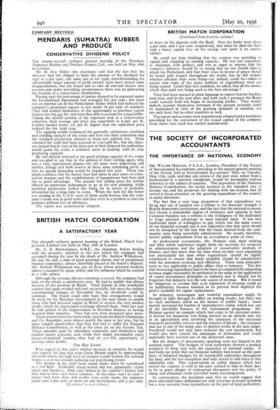THE SOCIETY OF INCORPORATED ACCOUNTANTS
THE IMPORTANCE OF NATIONAL ECONOMY MR. WALTER HOLMAN, F.S.A.A., London, President of the Society of Incorporated Accountants, presiding at the annual general meeting of the Society held at Incorporated Accountants' Hall, on Tuesday, May x7th, 1938, said that any review of the past year, either from a professional or a national standpoint, would be incomplete without reference to the subject of taxation. The imposition of the National Defence Contribution, the recent increase in the standard rate of income tax, and the proposals for dealing with tax evasion, had all served to focus attention on the growing expenditure of the country in many directions.
The fact that a very large proportion of that expenditure was being met out of taxation was a tribute to the financial strength of British democratic institutions, and the fact that the national economy hal shown a remarkable degree of resiliency and capacity to bear i creased burdens was a tribute to the willingness of the individual to forgo personal advantage to meet national need. It was that traditional spirit of willingness to pay which was the main source of our financial strength and it was imperative that that spirit should not be dissipated by the fear that the funds derived from the com- munity were being wastefully administered. He would, therefore, review public expenditure from an accountancy point of view.
As professional accountants, Mr. Holman said, their training and their whole experience taught them the necessity for economy in administration and the adoption of conservative methods of finance, and they knew that the time when receipts were expanding was particularly the time when expenditure should be rigidly scrutinised to ensure that funds available should be administered with the uttermost economy and efficiency. These same principles were no less applicable to public affairs than to, industry. The fact that increasing expenditure had so far been accompanied by expanding revenue might reasonably be attributed in the main to the application of sound accountancy principles to industry and it should not be forgotten that industry was the sole source of revenue. But it would be dangerous to assume that such expansion of revenue could go on indefinitely, because taxation at its present level depleted the profits available for capital replacement.
In industry, extravagant and wasteful expenditure might be brought to light through its effect on trading results, but there was no such automatic check on the misuse of public funds ; waste merely increased the burden of unproductive outlay which was one of the inevitable features of the rearmament prograMme. Mr. Holman quoted an example which had come to his personal notice. A factory for munitions was being erected on an entirely new site in an agricultural area involving the extension of the necessary transport and public services and the transfer of labour ; the clearance and use of one of the many sites of derelict works in the near neigh- bourhood would not only have reduced the cost enormously, but would also have caused the minimum of dislocation and would materially have assisted one of the distressed areas.
But the dangers of uneconomic spending were not limited to the national aspect. The budgets of local authorities showed a marked tendency to keep step with the expansion of national outlay. It had been our pride that our financial stability had rested on the same basis of balanced budgets by all responsible authorities throughout the land, and the few exceptions had only served to add force to this admirable rule. This conservatism in public finance which had served the country so well in the past seemed to him in these days to be in grave danger of widespread abrogation and the policy of cheap and abundant credit provided ready encouragement.
In continuation, the president said, that he would suggest that these abnormal times demanded not only economy in actual spending but a wise restraint from expenditure on the part of local authorities.


















































 Previous page
Previous page